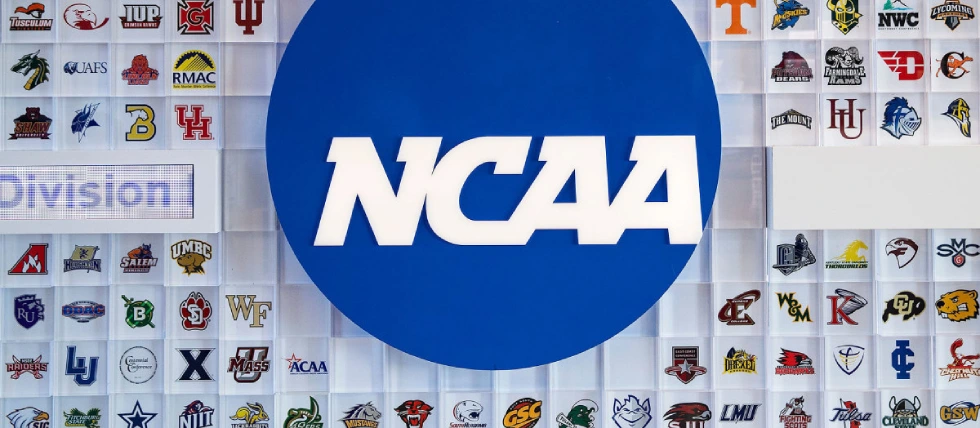NCAA Survey Reveals Student-Athlete Gambling Trends
A recent NCAA survey examining the gambling behaviors of over 20,000 student-athletes has provided new insights into how legalized sports betting is affecting NCAA players.

NCAA logo with multiple sports teams around it. NCAA study reveals the impact of legal sports betting on athletes.
This is the fifth study on the subject since 2004 and the first conducted after the 2018 Supreme Court decision that allowed states to legalize sportsbooks. Despite the rapid expansion of legal sports betting in the U.S., the percentage of student-athletes betting on sports for money remained relatively stable between 2016 and 2024. In 2016, when sports betting was legal only in a few states, 24% of male athletes admitted to placing bets in violation of NCAA rules. By 2024, with 38 states operating legal sportsbooks, that figure dropped slightly to 22%. This decline was seen across all NCAA divisions. Among female athletes, 5% reported betting on sports in both years.
NCAA President Charlie Baker spoke of the importance of education and prevention after the survey’s findings were released.
We need to continue to focus on education and additional harm prevention techniques in this space. Most young people are exposed to gambling while they’re in high school, and by the time they graduate college, some develop an unhealthy relationship with betting. We are focused on supporting student-athletes and providing them with resources to combat these behaviors.
Increases in Division II and II Athlete Betting
However, a closer analysis of frequent betting tells a different story. While monthly betting among Division I male athletes decreased slightly, Division II and III athletes showed increases. For example, in 2016, 12% of Division III men reported betting monthly; by 2024, this rose to 17%. In traditionally high-betting men’s sports such as baseball, basketball, and football, the percentage of frequent bettors among Division III participants ranged from 15% to over 25%. In contrast, Division I figures were much lower, at 2% to 8%.
Recognizing the potential risks, the NCAA updated penalties for sports betting violations in 2023 to reduce stigma and encourage students to seek help. Dr. Deena Casiero, NCAA Chief Medical Officer, has explained that harm reduction strategies are key to reducing risk and promoting healthy behaviors.
The study also found changes in gambling habits. Most athletes, 85% of men and 95% of women view gambling as a social activity. However, solo gambling among men has increased from 6% in 2016 to 15% in 2024, raising concerns about undetected problem gambling.
While most wagers involve small amounts, reports of significant losses have grown. Among male athletes who gamble, 2% reported losing $500 or more in a single day in 2016, compared to 5% in 2024.
More Responsible Gambling News
Increasing Requests for Insider Information
The widespread availability of sports betting has also led to an increase in requests for insider information from NCAA athletes. Despite this, Division I student-athletes were less likely in 2024 to provide such information knowingly than in earlier surveys.
The NCAA works with EPIC Global Solutions to deliver the largest sports betting harm prevention education program worldwide. Since 2022, EPIC has held sessions at over 260 schools, reaching 75,000 athletes, coaches, and administrators across 47 states.
Betting-related harassment is another concern. High-profile athletes, particularly in men’s tennis and basketball, reported harassment linked to betting interests. Among Division I players, 21% of men’s tennis players and 17% of men’s basketball players reported experiencing such incidents.
RELATED TOPICS: Responsible Gambling
Most Read
Must Read
 Interviews
Interviews
Sweepstakes Casinos: Thriving in an Ever-Changing Industry – Interview with Attorney Stephen C. Piepgrass
Feb 17, 2025 Interviews
Interviews









Review this New Post
Leave a Comment
User Comments
Comments for NCAA Survey Reveals Student-Athlete Gambling Trends